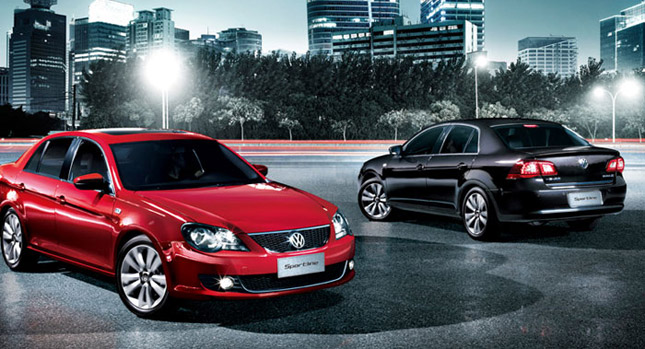Chinese carmakers and parts manufacturers stealing designs of components or even entire vehicles from Western automakers is nothing new, but we rarely see these issues coming out in the open when they happen. And if you are wondering why, it is because foreign companies don’t want to disrupt their business in the country.
However, on Friday, German business daily Handelsblatt reported that the Volkswagen Group is investigating allegations that its Chinese manufacturing partner FAW Group Corp. illegally copied and manufactured transmissions, engines and other components owned by VW.
 A Volkswagen spokesman in Germany was quoted by the Wall Street Journal saying that the company “was examining the situation carefully before coming to any conclusions”.
A Volkswagen spokesman in Germany was quoted by the Wall Street Journal saying that the company “was examining the situation carefully before coming to any conclusions”.
It was reported that VW managers recently uncovered FAW’s plans to copy the German automaker’s MQ200 transmission found in several Audi, Skoda and VW models and use it on the Besturn B50 small sedan, to be sold in Russia where it will compete against similar models from VW and Skoda.
The article on Handelsblatt notes this is not the first time that VW has had an intellectual property dispute with its Chinese partner, as at the end of 2010, the Germans discovered plans from FAW to replicate and build its EA111 petrol engine used on a wide variety of models including the popular Polo and Golf hatchbacks.
Volkswagen AG CEO Martin Winterkor confronted FAW Group chairman Xu Jianyi about the matter with his Chinese counterpart replying that he would investigate. FAW’s response came a few months later with the company blaming an engineer who had “misunderstood something”.
The German newspaper said that in the meantime, various engineering sources revealed that FAW had already built a factory in Changchun and had begun manufacturing the EA111 gasoline unit!
VW’s agreement with FAW is to build engines and other parts exclusively for their joint-venture products. “The plans were never allowed to go outside,” said a VW manager who wished to remain anonymous.
The problem stems from the fact that China does not allow foreign companies to operate in the country alone forcing them to share technologies and expertise with local partners through joint ventures. VW formed its partnership with FAW back in 1991.
“Western companies can only ensure that their products are as difficult to copy as possible. Everything else is like a fight against a windmill,” an auto analyst told the German newspaper. “Chinese companies can copy about 80 percent of a product perfectly, but then it gets difficult,” he said.
Nevertheless, when the AFP contacted VW about the Handelsblatt article, a company spokesman told the news agency: “We’re examining the issue very closely. On the other hand, we’ve always worked together with FAW very successfully and very trustfully in the past.”
As reported by the WSJ, these latest allegations come at a time when VW has already approved a €14 billion (US$17.2 billion) investment in China through 2016, as the German carmaker plans to lift its annual production capacity in the country to 4 million vehicles by 2018.
PHOTO GALLERY









